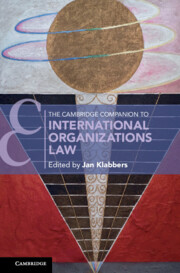Book contents
- The Cambridge Companion to International Organizations Law
- Cambridge Companions to Law
- The Cambridge Companion to International Organizations Law
- Copyright page
- Contents
- Contributors
- Acknowledgements
- Cases
- Introduction
- 1 Beyond Functionalism
- 2 The Concept of International Organization
- 3 Accountability
- 4 Inclusion and Exclusion in International Organizations
- 5 A Legal Framework on Internal Matters
- 6 Standard-Setting in UN System Organizations
- 7 Operational Activities
- 8 Deliberation
- 9 Teaching Statehood
- 10 Interaction between International Organizations
- 11 The International Organization for Migration and the Duty to Protect Migrants
- 12 Global Health
- 13 Energy Provision
- 14 International Organizations, Disarmament and State Behaviour
- 15 International Organizations and Stories of Development
- 16 Food Security and International Organizations
- 17 Financial Stability
- Epilogue
- Bibliography
- Index
9 - Teaching Statehood
Published online by Cambridge University Press: 31 March 2022
- The Cambridge Companion to International Organizations Law
- Cambridge Companions to Law
- The Cambridge Companion to International Organizations Law
- Copyright page
- Contents
- Contributors
- Acknowledgements
- Cases
- Introduction
- 1 Beyond Functionalism
- 2 The Concept of International Organization
- 3 Accountability
- 4 Inclusion and Exclusion in International Organizations
- 5 A Legal Framework on Internal Matters
- 6 Standard-Setting in UN System Organizations
- 7 Operational Activities
- 8 Deliberation
- 9 Teaching Statehood
- 10 Interaction between International Organizations
- 11 The International Organization for Migration and the Duty to Protect Migrants
- 12 Global Health
- 13 Energy Provision
- 14 International Organizations, Disarmament and State Behaviour
- 15 International Organizations and Stories of Development
- 16 Food Security and International Organizations
- 17 Financial Stability
- Epilogue
- Bibliography
- Index
Summary
Scholarship on international organizations law, like most approaches in international law and international relations (IR), is dominated by state-centric, functionalist and rational choice frameworks. According to these mainstream approaches, states are axiomatically the principal actors in international affairs, which pre-exist and create international organizations to serve their own interests and needs. To realists, international relations are structured by competition, the search for security and the struggle for power among rational, self-interested states. In this view, international organizations are epiphenomenal, reflecting extant power relations and having only a marginal impact on state behaviour.1 To IR scholars and international lawyers of a more liberal-institutionalist orientation, international organizations are designed and created by states to pursue shared goals, solve coordination problems and produce public goods.2
- Type
- Chapter
- Information
- The Cambridge Companion to International Organizations Law , pp. 199 - 221Publisher: Cambridge University PressPrint publication year: 2022

